youBEAT Café with Cristina Lazic – “FEELLING” the Dancefloors
Analysis of an underground successful artist’s path between clubs & festivals, studio & business
WHEN: November 24th 2023 – 2:15PM – 2:45PM
WHERE: BASE Milano – Ground Hall
SPEAKERS: CRISTINA LAZIC / LA ZIC (ITALY) – IN PERSON
HOST: RUDY CASSAGO / YOUBEAT – DANCE/ELECTRONIC NETWORK (ITALY) – IN PERSON
Welcome, ladies and gentlemen, to a special edition of the youBEAT Café!
On November 24, 2023, we brought our talk format in person at Linecheck IT during Milano Music Week 2023.
Nestled in the vibrant atmosphere of the Ground Hall at Base Milano, we engaged in a fascinating conversation with the accomplished Cristina Lazic. Our discussion revolved around the intriguing wordplay ‘Feelling’ cleverly uniting ‘Feeling’ and ‘Filling’.
These verbs are deeply intertwined with the dance floor experience and serve as a captivating case study for an underground project, such as Cristina’s.
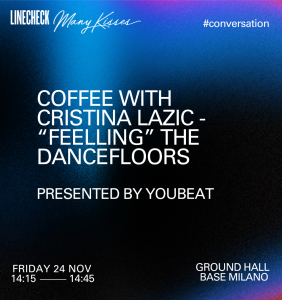
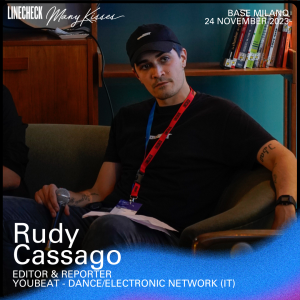
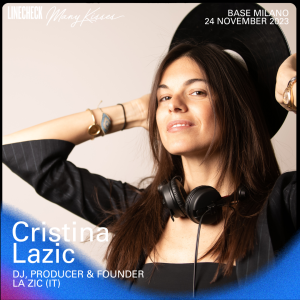
“FEELLING” THE DANCEFLOORS
Rudy: Okay, nice to meet you, everyone. Thank you for being here for this captivating conversation we are about to have. For those who don’t know me, my name is Rudy. I work for YouBEAT, an Italian electronic dance network, since 2012. Today, I am very honored to present our format, the café. So, this is the perfect time for it. And today, we have also chosen a very special guest to join us. We are honored to have the opportunity to talk with Cristina Lazic. Thank you for being with us.
Cristina: Hello, nice to meet you. Thank you. Very happy to be here today.
Rudy: So, let’s not waste our time and move on directly first of all, to the topic we have chosen for today. That is a word, but not a real word. That word is ‘feelling‘. We will work and talk about the feeling on the dance floor. The verb ‘to fill’ the dance floor, because Cristina is so used to filling the dance floor. But this is not the only thing we are going to talk about. Cristina is an interesting case study for our country and for the underground scenes since she launched this project. ‘Cause your work was different before, right?
Cristina: Yes, I have just changed careers. After 15 years of working in a typical office job, where I was involved in music and music publishing, I moved to the tech world until June of this year. So, I worked for a long time at Apple and Google, and now I’m dedicating myself to music full time.
Rudy: This is interesting because I would like to understand from you how you experienced the dance floor and how you felt about it before this shift. And later, we can obviously talk about the after.
Cristina: Yes, of course. Before becoming a DJ, I had always been a big lover of electronic music, attending many festivals and considering myself a proper raver, as they would say in the UK. I actually lived in London for a long time, and I always observed how DJs engaged with the dance floor. I was constantly looking for new talent, driven by my strong passion for music. This passion dates back to my childhood when my grandmother, who was a piano teacher, would spend days with me playing the piano by ear. Although I never learned to read music, I enjoyed playing by ear from the age of seven until I was 18.
During my teenage years, I aspired to be a singer and musician. I composed music and even created an album at a time when there was no X Factor or anything like that. Ultimately, I decided to pursue a typical office job because that’s what my family wanted. However, even while working in the office, I remained deeply involved in the music scene. I was always on the lookout for new DJs, observing the trends in electronic music.
It has always been a significant interest of mine. When playing, I would try to guess the next track the DJ was about to play, always paying close attention to the music. When I decided to take a DJ course, which I did during my maternity leave, it was a natural step for me. Most of my friends had always referred to me as the DJ because I often provided the music for various occasions, be it a birthday party, a wedding playlist, or creating CDs when I was younger. It just came naturally for me.
Rudy: I would like to highlight this topic because I believe it’s crucial for our conversation. Cristina is building a specific underground career, not a commercial or common one. It’s unique and necessary for this case study due to several factors. One key difference lies in the approach you take to take your initial steps and build the community you are growing now. We know you are developing various interconnected elements, such as your broadcast channel and the ‘Lazic Of The Day’, which is a cool format. I’m keen to understand your opinion and the ideas behind these choices to grow your community within your project.
Cristina: Yes, okay, you’re right. I am definitely playing a type of music and producing a type of music that can be defined as underground. My music is somewhere between minimal and deep tech, but it also incorporates some melodic elements. This is why I’m founding my own label because I have a sound that cannot be easily categorized as one or the other.
As I mentioned earlier, my background includes a mix of music and technology, and I’m very fascinated by marketing, innovation, and the digital world. This digital focus contrasts with the world of minimal music, which is typically embraced by purists favoring vinyl, analog hardware, mixers, and so on.
I wanted to combine these two passions of mine—tech and music, both very underground. A few years ago, during COVID, I started a format of videos on social media called ‘Vinyl Pick of the Week‘, where I would showcase labels or producers that I liked. I’d take my vinyl collection, play two records from the same label or producer, and showcase myself playing them. This format allowed me to get in touch with one of the labels I love the most, called Bondage Music, a respected German label in the world of minimal and deep house. They saw one of my videos, and they expressed interest in hearing my demos.
We like that you. So please send us music and I actually produced some music for them and I ended up releasing with them. And now I’ve already released one EP and several remixes and I have one more EP coming out with them. And it’s a label that I like because it’s very underground but it has names like Mihai Popoviciu or Sasha Dive, Steve Bug, which are very respected in the underground world. But they found me through social media and through this digital type of format that I launched. This made me reflect about the fact that also this community is eventually adopting also the use of digital tools, right?
And now what I’m trying to do is to launch a label. That will be called La Zic, which in French slang means the music, which is written the same as my DJ surname, and it’s the surname of my husband. And with La Zic, I would like to really, first of all develop this new type of sound, which I think I have developed with my productions.
Again, somewhere in between minimal and melodic. But also give the opportunity to younger artists who make similar music to mine, to emerge, and involve these bigger producers, as remixers. So that we can create a community of people that can really work together. And with that, going back to the digital part, I am trying to help this underground community get more exposure through digital.
So I’m making a big effort with the label. First of all, I’m going to do mentoring to them, to help them on this. Kind of, you know, marketing side and also I am planning to invest a lot in creating content that can help give them exposure on digital. So I hope that this is going to give them, you know, a new way to see what’s out there apart from the very, very underground world that we are used to seeing.
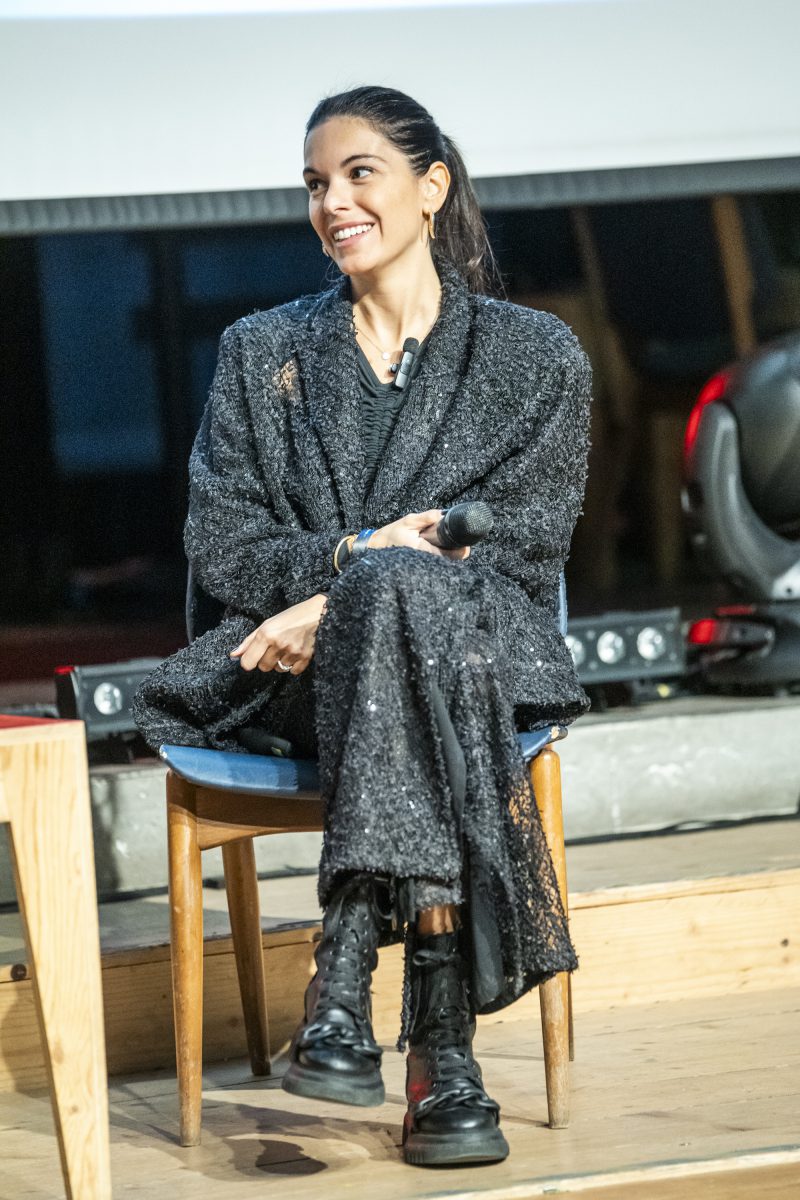
Rudy: Yeah, there are several differences between your path, given that it’s underground, and that of a normal artist who ventures into other genres of electronic music, less in the deepest part of this field. The crucial point that has emerged in the last few months, as we’ve discussed, is the new approach, especially in the underground field, to the category of superfans. We’ve talked about superfans in various ways, and I’ve seen many different opinions about it.
We could argue that superfans have always existed, even back in the CD era of the 90s when fan clubs were common—a phenomenon not so prevalent nowadays. I’m 30, so in my era, we had fan clubs, lol. In the underground scene, many artists are working closely, as you are, building your own record label instead of trying to sign with important or iconic labels exclusively. You aim to bring other women and artists in general under your mentorship and through your channels to gain more recognition. However, you are also tapping into the real potential of these superfans because, as you know, streaming and physical music present different challenges and alter this approach a bit.
Cristina: Yes, I don’t want to hide that releasing on important labels can be beneficial. For example, I’m collaborating extensively with Damian Lazarus, who happens to be in Milan tonight. Anyone who’s a fan can go listen to him. We’re collaborating on various fronts, and I’ve released a lot of music on his sub-label, Rebellion, which is a part of Crosstown Rebels. Additionally, I will have a release soon on Crosstown Rebels itself. Damian has also involved me in several of the parties he organizes, providing me with exposure. So, I want to acknowledge that releasing on big labels can indeed be helpful.
However, I believe that what can make the difference nowadays is building your own community, as you mentioned. This community can be formed through organizing events or setting up a label. In any case, you should establish a strong brand that, over time and if done well, can emerge and become something akin to what Fuse, Solid Grooves, and No Art have become. These are all movements that originated in the UK, where I grew up. I also hold British citizenship, and I’ve witnessed this as a significant trend that can create a lasting impact rather than just relying on big labels. It’s about building a legacy as an artist, which is challenging. I left a comfortable industry and job because I want to build something enduring with music. Having a label and eventually organizing showcases to create a community of like-minded people who appreciate the same type of music can allow me to achieve that and can benefit everyone involved.
Rudy: So, are you trying to, I don’t know, draw inspiration for building a culture from other countries? You mentioned Solid Grooves. For me, these kinds of entities feel more like collectives than record labels because all these artists are genuinely collaborating together.
Cristina: Absolutely, and actually, the artists that are part of LaZic, they are all friends. While some are from Milan, throughout the years, I have collaborated with several artists. For instance, the founders of Bondage, Four Bugs, will be remixers on my label. I have been a remixer on their label and have also released a piece. We’re collaborating together, and potentially, one day we’ll do a showcase together, right? So, that’s how things, in my opinion, can be successful because music is about sharing, sharing good vibes with people. You need to do that by being on the same frequency with others.
Rudy: I understand, it’s a tricky question, especially because your genre may not be centered around these kinds of platforms. I’m talking about platforms like AUDIUS, for example, or others built on blockchain or various technologies. The focus is that they are trying to explore different ways outside the mainstream channels to compensate super fans or pay artists through the super fans that usually follow these platforms. AUDIUS, with its 7 million users per month across all genres, is pursuing alternative approaches compared to, for example, vinyl.
We all know that music operates in cycles. Physical music is making a comeback, with vinyl experiencing a significant resurgence, especially in the U.S., which is the world’s largest market. They recorded the biggest rise in vinyl sales in the past year. Both digital and physical approaches for super fans have their merits, but do you think the physical approach, inspired by the old industry, is still better than this new one?
Cristina: It’s a mix, in the sense that I’m passionate about both collecting vinyl and exploring NFTs. I have to be honest; in the underground community, it is quite challenging to get them onto things like tokens and NFTs. I tried myself last year, and the response wasn’t that great, as they perceive it as something too advanced. They’re more inclined towards physical stuff.
However, if you attach the idea of having some sort of membership, and I’ve launched this collection of ten tokens (NFTs), which people can buy. These tokens give them a forever guest list whenever they come to listen to me, which can be a good deal, especially if I play at a club like Hï Ibiza where the tickets can be expensive. They can also enjoy some perks like getting access to my music before anyone else, similar to how I send promos to other DJs. Additionally, there are special perks such as exclusive vinyl releases, something that will be coming with LaZic. I’m involving artists from that world, like Ruzau, a prominent producer from Romania known for the typical Soundwaves festival environment, focused on vinyl-only releases.
I’m trying to blend everything. For instance, one of my super fans lives in Romania and is a big fan of underground music and events like Soundwaves. There is a niche audience for that as well.
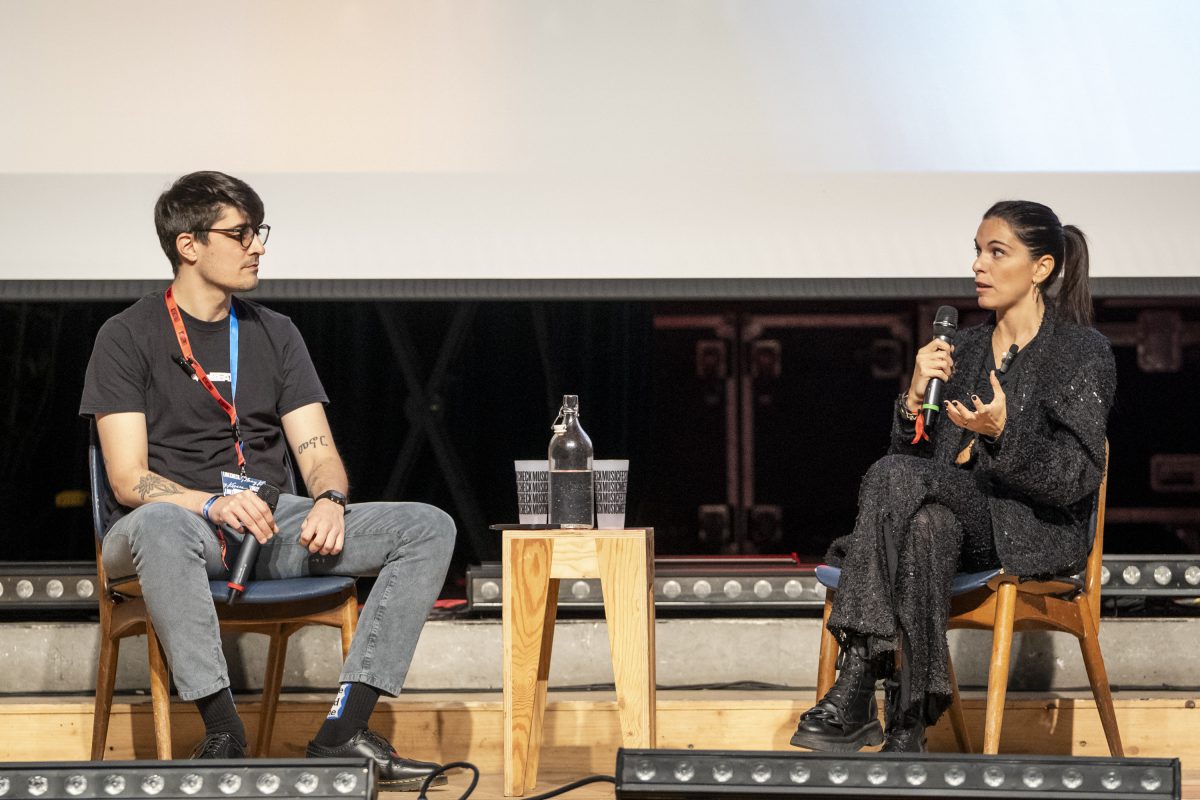
Rudy: We’ve discussed your approach to the business side of things quite a bit. Now, I’d really like to delve into your approach to feeling and connecting with the dance floor both in your live experiences and in the studio. These aspects are deeply connected, as you release music with the aim of connecting with people.
Cristina: Yes, exactly. My mission is to make people dance and enjoy themselves. One of the things that brings me the most joy is when people, after a night where I was playing, tell me they had so much fun. That, for me, is the purpose of music – to truly make people enjoy and have fun together. That’s why I believe it’s crucial to learn to read the crowd and the dance floor. As I mentioned earlier, I’ve always been doing this, even before becoming a DJ. I paid attention to whether the DJ was connecting with the crowd or not.
Now, as a DJ, I strive to do the same. Clearly, if you’re playing at the peak time in a place like Hï Ibiza, music that suits a sunrise set at Soundwaves may not fit properly. So, it’s important to understand what the crowd wants while keeping your style and connecting with them. I believe that’s the DJ’s job – to maintain your style but also comprehend what’s happening and connect. By connecting with the crowd, I gain a tremendous amount of energy. People used to ask me when I was still working for Google, ‘Aren’t you tired?’ And I would say… ‘No!’ The energy I get from dancing with people and having fun with them actually recharges me. I don’t feel exhausted afterward. I feel more tired after a day of back-to-back meetings over my laptop, honestly. It’s an exchange of energies for me, and it gives me a lot of satisfaction.
Rudy: Adrenaline is different. I felt the same in 2022 when I was working at Tomorrowland for YouBEAT. We walked like 55 kilometers in two days just inside the festival, and we didn’t feel so tired because, you know, energy is energy.
We don’t have much time, but I really want to touch on this topic briefly. Last week, we discussed your approach to the dance floor and the underground world. You mentioned that it is still a male-dominated field in music at the moment, and you are actively working to change that by bringing in other interesting women artists to this genre. I particularly love UK music, and in other electronic music fields, lots of women are finally rising. I’ve been involved in conferences for about five years now, and this topic is still on the forefront.
Cristina: Yes, definitely, there are more female DJs and producers than there used to be. Ten years ago, there were quite a few in techno and in this new genre called hard techno. Every day, I see new female artists emerging, and it makes me very happy. In my style, let’s call it minimal, there are definitely not enough women. Currently, I think only 2 percent of producers in this genre are women. Whenever I’ve released music, I’ve noticed the charts, and there were basically no female names.
So, I’m on a mission to discover and promote female producers in minimal music. I already have three who will be involved with my label, which is very exciting. However, I’m actively seeking more, and I hope that with the mentorship program I’m launching alongside the label, I can inspire more women to join. Sometimes, it’s a matter of self-confidence, as women may feel they lack the necessary skills. However, building the mindset that you can learn, even the technical skills, can lead to success. I started with no knowledge, never having studied sound engineering, but I received help from some people, and I progressed. Now, I’ve released a lot of music and am launching my label. It’s all about taking small steps.
In general, there are many communities of women supporting each other in music, and the work of these communities is making a significant impact. For example, She Said So, of which I’m a part, is doing a lot to provide a safe space for women.
Rudy: Yeah, in the last few years, especially after the pandemic, I’m delighted to hear that, apart from She Said So, there are several initiatives working on increasing female representation. After hearing numerous stories, including not-so-good ones from the backstage interactions between male and female artists, I genuinely hope that in the next few years, this overall scenario will change, and we’ll see more women on the dance floor. It’s time for a shift. Even in Italy, we still have festivals with only male acts, and I don’t think it’s right because there are many talented women who deserve recognition.
Audience Question
- Hi Cristina. I would like to know if you have any specific projects you’d be able to NFT for yourself as an artist, or if you have any plans to own a drill next year.
Cristina: Yes, as I mentioned earlier, I have a project called Last Ditch Tokens, consisting of ten tokens available for people who want to become my super fans. By becoming a super fan, you will always have access to the guest list whenever you come to listen to me. You will also receive music before anyone else, similar to the DJs to whom I send promos. In the future, I’m considering adding more perks, such as receiving vinyl from my label or merchandise from my label.
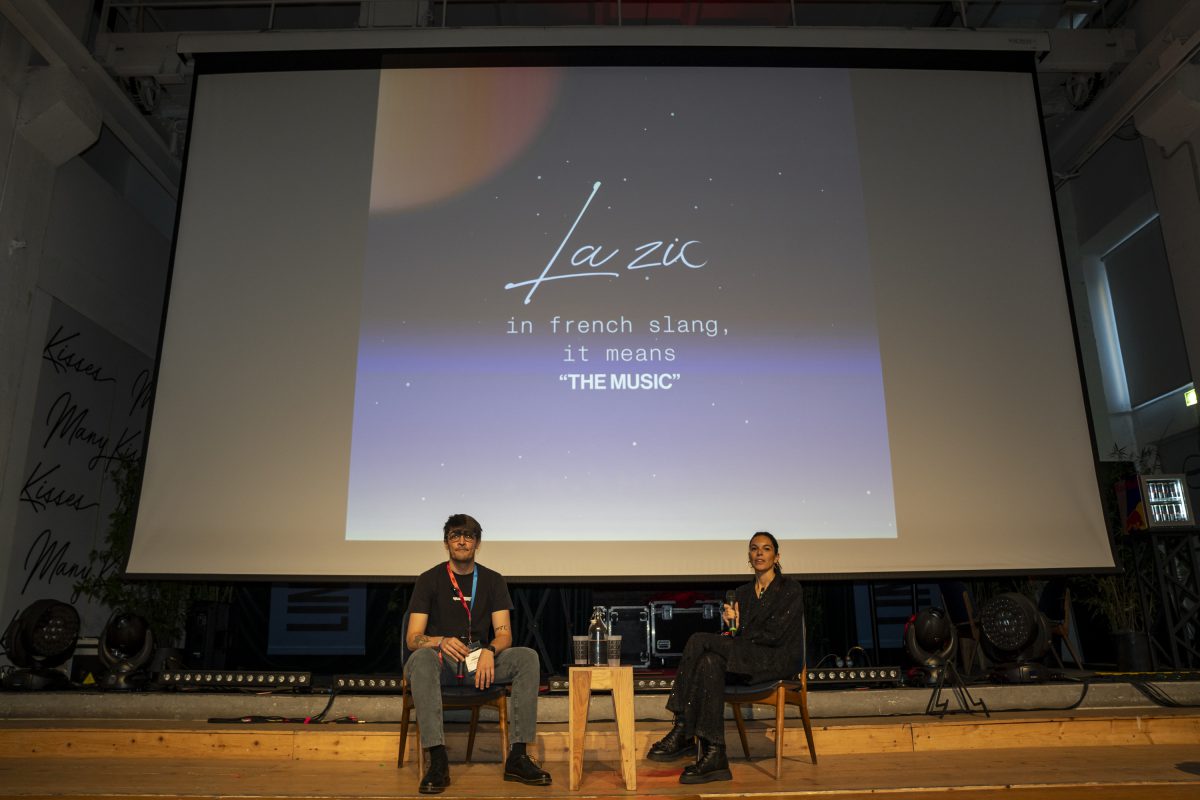
*Thanks to Linecheck, Music Innovation Hub and Cristina Lazic for the conversation!
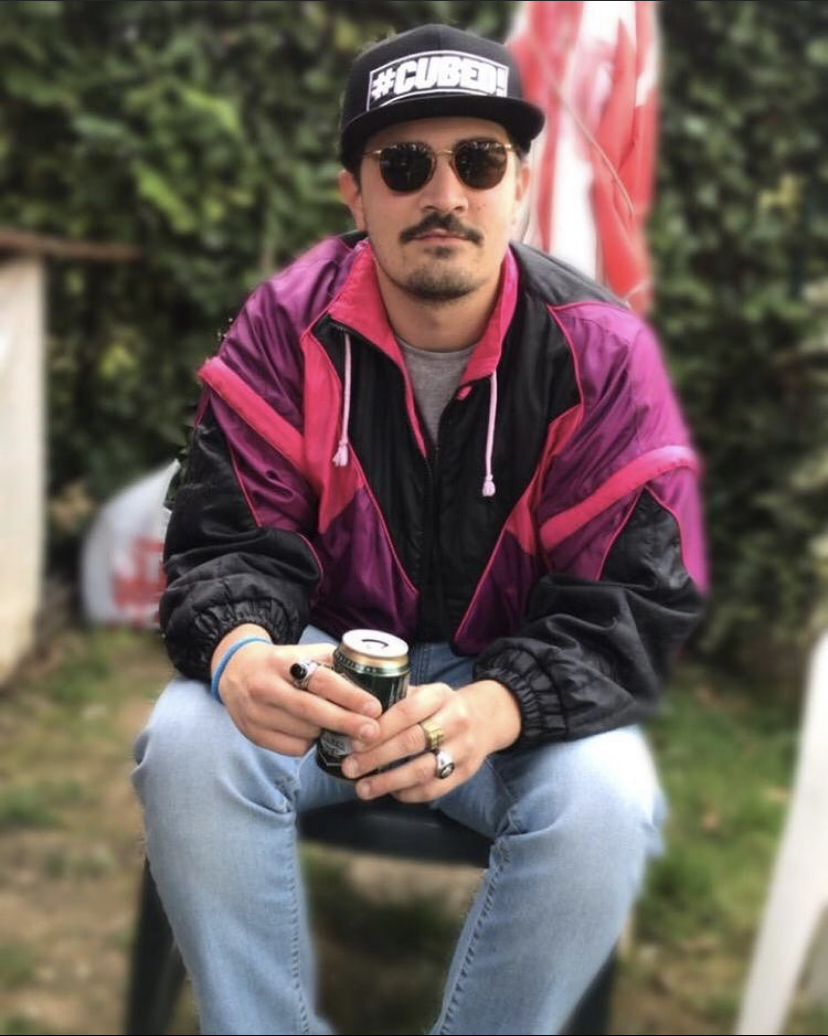
Rudy (32) currently based in Bergamo, here since 2019.
https://www.linkedin.com/in/rudy-cassago-522452179/
